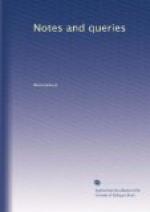A wasteful use of perfumes at funerals (sumptuosa respersio, Cicero de Legibus, ii. 23.) was forbidden by the Twelve Tables. The eighth verse of the fifty-sixth Psalm,
“My flight thou numberest:
put my tears in thy bottle: stand they not
in thy book?”—Hengstenberg,
Clarke’s Tr. Edinb.
is, I believe, the only evidence that can be brought in favour of the old opinion; but we surely cannot take the highly figurative language of Eastern poetry to establish a Roman custom of which we have no hint elsewhere. This verse admits of a much simpler interpretation; see Arndt, quoted by Hengstenberg ad locum. From a review of Museum Disneianum, which appeared in No. XXIII. of the Classical Museum, it seems that Mr. Disney has devoted to this subject some pages of the introduction to Part II. of the above work, of which a summary is given by the reviewer.
ED. S. JACKSON.
Torreridge, Herts, Oct. 23.
Querela Cantabrigiensis (Vol. ii., pp. 168. 205.).—MR. SANSOM is sustained by Anthony Wood in assigning the Querela to Dean Ryves; but it may be doubted whether he were anything but the editor, publishing it as an Appendix to the Mercurius Rusticus. The title of the work is Querela Cantabrigiensis: or A Remonstrance by way of Apologie for the banished Members of the late flourishing University of Cambridge, by some of the said Sufferers. Now Dean Ryves was a member of the University of Oxford. In Wood’s Fasti, it is stated that he took the degree of B.A., Oct. 26, 1616, being then of New College. On June 9, 1619, he was admitted of Magdalen College, as a member of which he took his B.D. in 1632, and proceeded to D.D. in 1639. He had nothing therefore to do with the sufferings of the members of the University of Cambridge. In the Life of Dr. Barwick, the account given of the Querela Cantabrigiensis is:—
“But Mr. Barwick’s no inconsiderable part of this tragedy, together with others of the university, groaning under the same yoke of tyranny, and each taking a particular account of the sufferings of his own college, {449} gave a distinct narrative of all these barbarities, and under the title of Querela Cantabrigiensis, or the University of Cambridge’s Complaint, got it printed by the care of Mr. Richard Royston, a bookseller of London, who did great service to his king and country, by printing and disposing, in the most difficult times, books written in defence of the royal cause.” pp. 32-33.
In the Appendix (p.495. note), Dr. Bruno Ryves is mentioned, and spoken of as the author of Mercurius Rusticus; but no notice is taken of his being one of the authors of the Querela. Of Dr. Ryves, who assisted in the Polyglot, a good account is given in Todd’s Life of Bishop Walton, vol. i. pp. 306-309.




